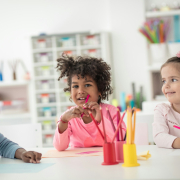Making Friends And Memories: Nurturing Social Skills In Your Little One
Social skills are essential for children to interact positively with others. Developing these skills at a young age helps children build friendships, communicate effectively, and navigate social situations confidently. When children learn to share, take turns, and listen to others, they build a strong foundation for future relationships.
Early childhood is a critical period for social development. During this time, children begin to form their first friendships and learn important social behaviours. These early interactions shape their ability to connect with others and lay the groundwork for emotional intelligence.
Encouraging social interaction and providing opportunities for children to engage in group activities is key to nurturing their social skills. Simple actions like playing with peers, participating in group games, and having regular playdates can significantly impact their social growth. Structured and unstructured play both offer valuable lessons in cooperation, empathy, and communication.
In this article, we will explore the importance of social skills in early childhood and provide practical strategies and activities to help your child make friends and build lasting memories. By fostering a supportive environment and being involved in your child’s social development, you can help them thrive socially and emotionally.
Understanding the Importance of Social Skills in Early Childhood
Social skills are crucial for children’s development and overall well-being. These skills enable children to communicate, collaborate, and resolve conflicts effectively. Learning social skills in early childhood prepares children for future relationships and helps them succeed in school and beyond.
Children who develop strong social skills are more likely to have positive interactions with peers and adults. They learn to read social cues, understand others’ feelings, and respond appropriately. These abilities contribute to forming and maintaining healthy relationships.
Social skills also boost children’s confidence and self-esteem. When children can express themselves clearly and engage in meaningful interactions, they feel more confident in their abilities. Positive social experiences reinforce their sense of belonging and acceptance, which is vital for their emotional and psychological health.
Strategies for Encouraging Social Interaction
Encouraging social interaction helps children practice and develop their social skills. Here are some effective strategies:
1. Playdates: Arrange regular playdates with children of similar ages. This provides opportunities for your child to practice sharing, taking turns, and cooperating.
2. Group Activities: Enrol your child in group activities such as sports, dance classes, or art workshops. These settings teach teamwork and foster a sense of community.
3. Modelling Behaviour: Demonstrate positive social interactions yourself. Children learn by observing adults, so show kindness, patience, and good communication.
4. Games and Role-Playing: Engage in games and role-playing activities that require turn-taking and cooperation. These activities make learning social skills fun and interactive.
5. Positive Reinforcement: Praise your child when they display good social behaviour. Positive reinforcement encourages them to continue these actions.
Creating an environment that supports social interaction helps your child build meaningful relationships. By using these strategies, you can help your child develop the necessary skills to navigate social situations confidently and successfully.
Activities That Promote Friendship Building
Engaging in specific activities can help children build friendships and improve their social skills. Here are some activities that can encourage children to make friends and enjoy their time together:
1. Team Sports: Joining a sports team allows children to work towards a common goal and learn valuable skills like cooperation and teamwork. Sports like football, cricket, and basketball are great options.
2. Arts and Crafts: Group art projects encourage creativity and collaboration. Children can work together on murals, collages, or simple crafts, fostering communication and shared achievement.
3. Story Time: Reading stories in a group setting and discussing them can help children connect over shared interests. It also encourages listening skills and empathy.
4. Board Games: Classic board games like Snakes and Ladders or cooperative games help children learn about taking turns, following rules, and working together.
5. Outdoor Play: Activities like building sandcastles, playing tag, or organising scavenger hunts can create opportunities for children to interact and build friendships in a natural, fun environment.
These activities help children learn how to interact positively with their peers, build friendships, and develop essential social skills in enjoyable ways.
Role of Educators and Parents in Nurturing Social Skills
Both educators and parents play crucial roles in nurturing a child’s social skills. They provide the support and guidance children need to develop positive interactions and healthy relationships.
Educators’ Role:
Educators are instrumental in creating a supportive and inclusive classroom environment. They can:
– Model Positive Behaviour: By demonstrating respect, kindness, and patience, educators set an example for children to follow.
– Facilitate Group Activities: Planning and leading group activities help children practice cooperation and teamwork.
– Provide Guidance: Educators can offer support and advice during social interactions, helping children navigate conflicts and understand social dynamics.
Parents’ Role:
Parents are a child’s first teachers and have a significant impact on their social development. They can:
– Encourage Playdates: Organising playdates with other children helps kids practice social skills in a comfortable setting.
– Teach Empathy: Parents can teach children to consider others’ feelings and show understanding through simple conversations and daily interactions.
– Set Social Expectations: Setting clear expectations for behaviour and reinforcing good social skills helps children understand what is appropriate and acceptable.
By working together, educators and parents can provide consistent support and opportunities for children to develop strong social skills.
Conclusion
Nurturing social skills in early childhood is crucial for a child’s overall development and happiness. Understanding the importance of social skills, encouraging social interactions, engaging in friendship-building activities, and the active roles of educators and parents are all key elements in this process.
At Eskay Kids, we focus on a play-based curriculum that supports these essential aspects of social development. Our goal is to create a nurturing environment where children can thrive, make friends, and create cherished memories. If you want to learn how our early childhood programs can benefit your child’s social growth, visit Eskay Kids and discover more about our approach.




